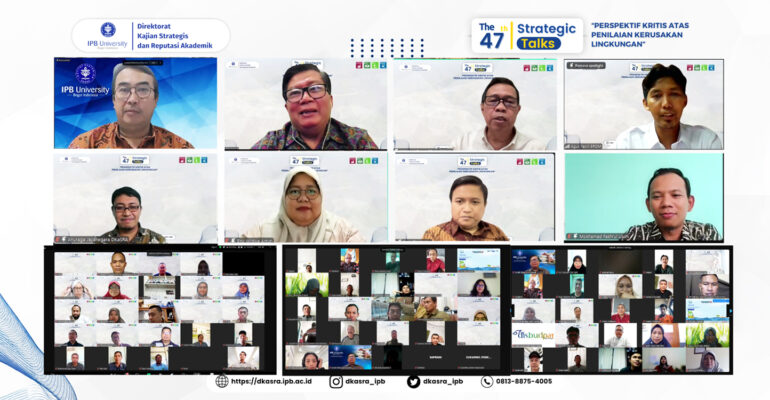IPB University Highlights the Importance of Environmental Damage Assessment in Ecosystems

IPB University held The 47th IPB Strategic Talks, focusing on the importance of environmental damage assessment, particularly in natural resource ecosystems (4/2).
The event was opened by Vice Rector of IPB University for Research, Innovation, and Agromaritime Development, Prof Ernan Rustiadi. He stated that environmental issues are strategic concerns that remain relevant for continuous study and discussion.
Prof Dodik Ridho Nurrochmat, an environmental policy expert at IPB University, started the session with a detailed explanation of the legal framework governing environmental damage assessment in Indonesia, particularly Minister of Environment Regulation (Permen LH) No 7/2014.
He explained that this regulation is an implementation of Law No 32/2009 on Environmental Protection and Management, which allows government institutions to file lawsuits for compensation against businesses responsible for environmental damage.
“The value of environmental losses can be unlimited, covering both direct and indirect damages, and requires a complex evaluation to ensure fairness and effectiveness in environmental restoration,” said Prof Dodik.
Prof Akhmad Fauzi, a professor of natural resource and environmental economics at IPB University, introduced the Natural Resource Damage Assessment (NRDA) approach as a global standard methodology for environmental damage assessment.
A lecturer at IPB University’s Faculty of Economics and Management (FEM), he explained how this approach integrates economic, social, and environmental aspects to produce more accurate damage estimates.
“NRDA helps us not only calculate losses but also determine compensation values and effective restoration strategies,” said Prof Fauzi to 530 participants attending via Zoom Meeting.
In the third session, Agus Yasin, SHut, MSc, from the Peatland and Mangrove Restoration Agency, specifically discussed the challenges in assessing damage to peatland and mangrove ecosystems.
Yasin highlighted the limitations of accurate environmental data and methodological discrepancies, which often hinder the enforcement of sanctions and effective restoration efforts.
“Public awareness and community participation are crucial for enhancing the effectiveness of environmental assessment and restoration,” Yasin stated.
The speakers emphasized the importance of ecosystem restoration that not only considers economic value but also focuses on restoring lost biodiversity and ecological functions.
Recommendations from the webinar included strengthening inter-agency and cross-sector collaboration, developing more innovative damage assessment methods, implementing environmental compensation payments for ecosystem recovery, and increasing public engagement in assessment and restoration processes. (DKSRA/Rz) (IAAS/RUM)



